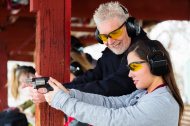Beginner Tips for Carrying a Concealed Handgun

You may find a handgun a burden to carry, but that's not half of it. What takes a lot more effort and time is being able to handle your firearm with proficiency. Take a look at these five tips:
1. Knowing the Law
First of all, carrying a concealed handgun needs legal authority. In nearly all states, you should get a CCW permit for this. Besides the legal aspects surrounding just carrying a concealed handgun, you must also be aware of self-defense laws in your state. If you know enough about the laws that govern self-defense and the use of deadly force, you won't think twice about firing your weapon when you have to.
2. Concealing Your Weapon
If you're carrying a concealed handgun, know that an innocent but uncalculated movement, such as bending to tie your shoelace, can reveal your secret. The rule of thumb is keep your gun hidden until you have to expose it. Spend time finding the best covering garment and holster. If that's too cumbersome for you, perhaps you should reconsider the concealed carry lifestyle.
3. Knowing Your Position
Even if a crime that clearly requires a deadly law enforcement defensive tactics force response unfolds before your very eyes, that doesn't mean you have to use your gun just because you have one. What if, as you draw your gun to shoot the bad guy in front of you, another bad guy shoots you from behind? Even when there's but one bad guy in the picture, you starting a gun fight could still result in endangering, if not claiming, innocent lives. You should only consider using your gun when the attacker has made clear his intent to attack. Know and understand your position and capacities first before you decide whether or not your intervention is useful.
No Bluffs
Unless you're absolutely certain that you can fire that gun with accuracy, you can't justify carrying it. Carrying a weapon simply to bluff an assailant is one great recipe for disaster. Before you show the slightest sign that you have a gun, make sure you've made the decision to fire it at the assailant, and that you can possibly kill him using extreme close quarters combat. Otherwise, the criminal will know it and may capitalize on your weakness by disarming or even shooting you.
Being Ready for a Fight
Even when shooting your enemy is legally justified, close confines can make things more complex. Don't gamble your life relying on marksmanship alone. In close quarters, what's more important is that you can fight with your gun, rather than shooting exceptionally. You may shoot the assailant many times and still need to fight him, possibly to get control of your weapon. In this case, your gun retention skills could save you. If nothing works and you still can't protect yourself empty-handed, shooting the enemy at point-blank range may be your only chance to live. Visit http://www.britannica.com/EBchecked/topic/533371/self-defense to read laws concerning self defense.